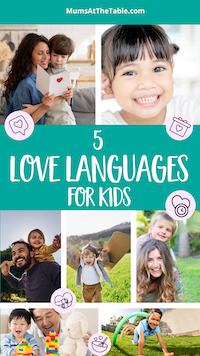Back in 1992, Dr Gary Chapman released the book, The Five Love Languages. It was a New York Times’ bestseller with over 10 million copies sold, translated into 45 languages and is still being avidly read worldwide.
Countless couples have improved their relationships from implementing the concepts in the book, developing deeper feelings of love and appreciation.
Five years later, Dr Gary released another book, titled The 5 Love Languages of Children. This has been a groundbreaking book for many parents and has helped children feel more deeply understood, valued and, most of all, loved.
Dr Gary premises that each person has a primary love language they “speak”. It’s also the language they desire other people to use when interacting with them. Love languages are kind of like love tanks that need to be filled with a specific ingredient.
The problem is, parents often don’t know their child’s love language and, as a result, a child can feel unloved and unnoticed. A parent may also have a different “language” from their child and therefore finds it hard to show love in the way the child needs.
What are the five love languages for kids?
The concepts that Dr Gary shares in his book are essentially about how to increase a child’s sense of self-worth, love, belonging and role in the family. He narrowed down the ways children feel loved to five key ones (not dissimilar from the original):
- Words of affirmation
- Acts of service
- Gifts
- Quality time
- Physical touch
These five different love languages for kids will tell you a lot about your child, how they feel loved, and how they give or show love. These concepts apply if you have young children, older children or even adult children.
However, even if your child has a dominant love language, Dr Gary encourages parents to “speak” all five. The key is to pay attention to the strongest, while not forgetting the others.
If you want to build a stronger relationship with your child by interacting with them based on their love language, take our love language test for kids.
Here’s a bit more about the five love languages for kids:
1. The power of words
If words of affirmation is your child’s primary love language, you can expect them to beam when you compliment them or their work, or when they hear verbally that you are proud of them. They will want to have interactive conversations with you, where they get to hear your thoughts about them and share their thoughts.
Children who value words will need you to listen actively because it takes a lot of courage for them to speak their mind and words are very important to them. They may not always have a lot to say, but when they do say something it’s extra special and they just might have been planning it for a while. These kids love a good book, thoughtful gifts which include words and heartfelt messages (think a note in the lunch box).
2. Actions speak louder than words
If you have a child whose primary love language is acts of service, you may hear things like, “Can I help you?” or “Can you help me?”. Acts of service will light up their world and make them feel like you love them.
For example, if your child has a big assignment they’re working on and you voluntarily do the dishes when it was their night to do it, they will feel like you appreciate them, that you understand how stressed they are feeling and ultimately that you love them. There are lots of practical ways you can show your child you love them without saying a word.
3. Gift-giving
Some children will feel extra special and loved if you give them a gift that lets them know you were thinking about them. It can’t just be any gift. It has to be something that lets them know you know them or their favourite colour, animal or food. This speaks volumes to them. It tells them that you actually listen to them and what they like, and you took time out of your busy day to get them something they will really enjoy.
Gifts don’t have to be expensive or even cost at all. There are many different ways you can give a gift without it costing money. For example, an amazing beach shell you found for their shell collection, or pressing some flowers from the garden and making them into a bookmark.
4. Undivided attention
The love language of quality time is often the hardest for parents to give to their children, and many parents try to make up for it by giving the child lots of gifts. Sadly, materialistic things can never replace the personal connection that the child so deeply wants.
Quality time doesn’t necessarily look like hours on end of uninterrupted play, but it does require genuine undivided interest to make it count. Parents can’t be “watching” their child play while talking on their phone, gardening or reading. Children have very deep insight and can discern if a parent is really interested in them or not. If not, they will eventually stop trying and turn to someone else for the emotional love they are looking for.
5. Hug me!
Last, but definitely not least in our list of love languages for kids, is physical affection. All children thrive on physical contact and without it, babies and little children can die due to failure to thrive. However, physical affection means more than just survival. It could be the determining factor between a flourishing child and an aloof, disconnected one.
Children whose primary love language is physical touch will need regular attempts of connection to feel loved. This could be a pat on the back, a hug, holding hands while going on a walk or a game of tickles. Physical affection tells them you’re with them, you’re on their team, and you appreciate and love them.
Find out your child’s love language
A child’s need of greatest importance may sometimes look like behaviour control or an attitude adjustment. Children struggle to respond in healthy ways when they feel you don’t love them or care. Unconditional love is crucial to raising healthy, confident kids, and you want to show them love in the language that speaks most clearly to them.
If you want to see some big positive changes in your love relationship with your child or help a family member or friend with their child, take our quiz to find out your child’s love language.

How helpful was this article?
Click on a star to rate it!
0 / 5. 0
Be the first to rate this post!
Adriana Wales
Related posts
Subscribe
Receive personalised articles from experts and wellness inspiration weekly!

